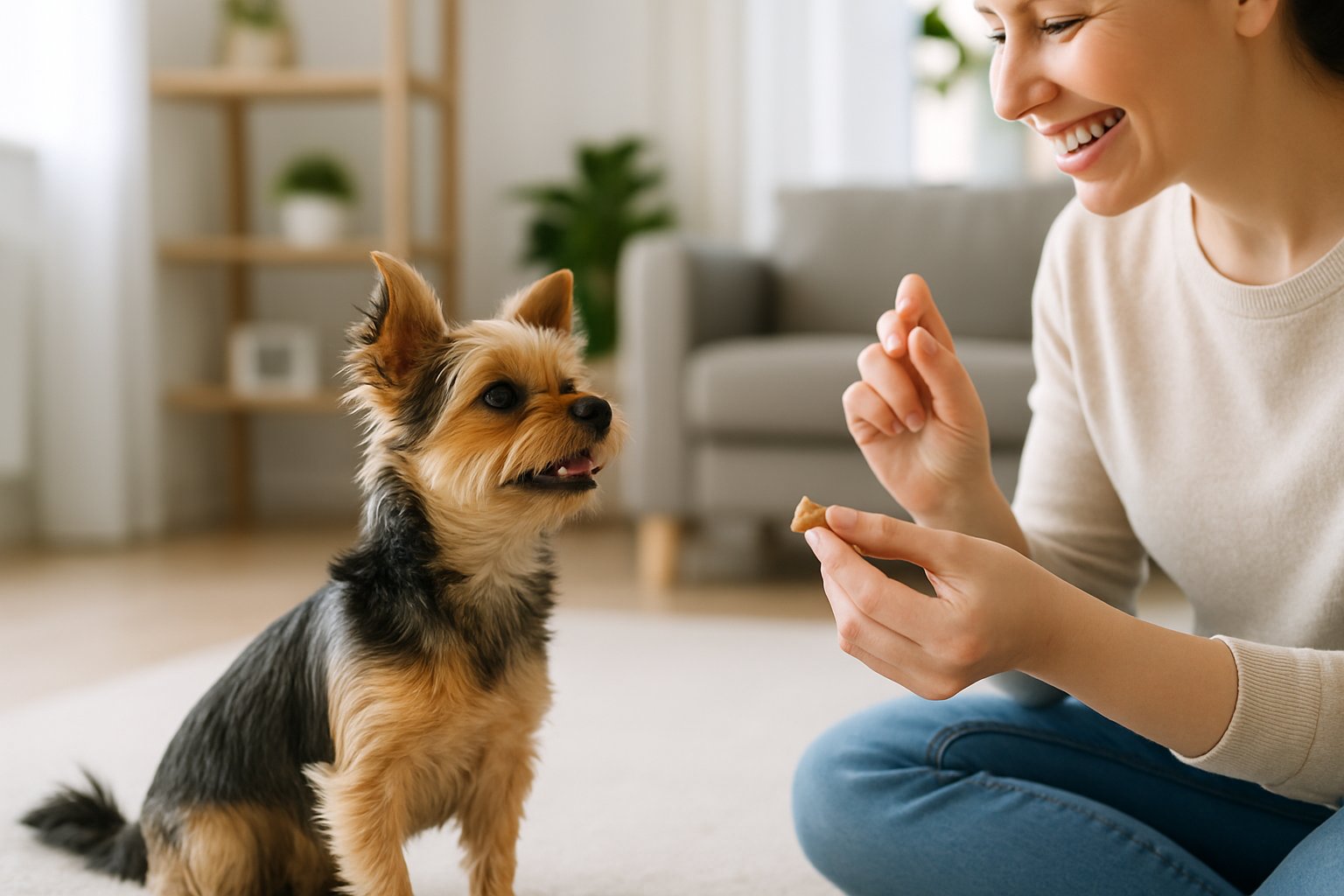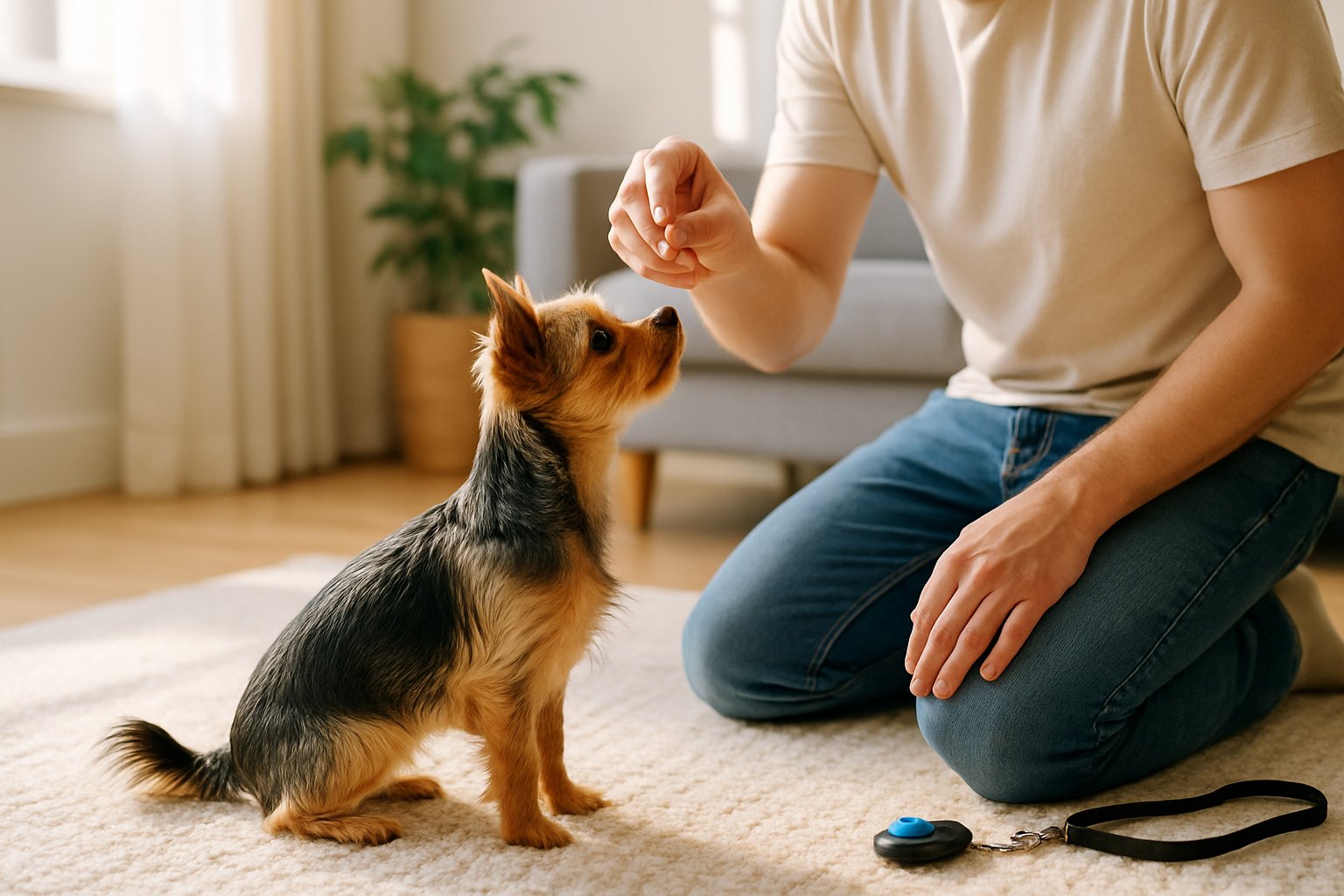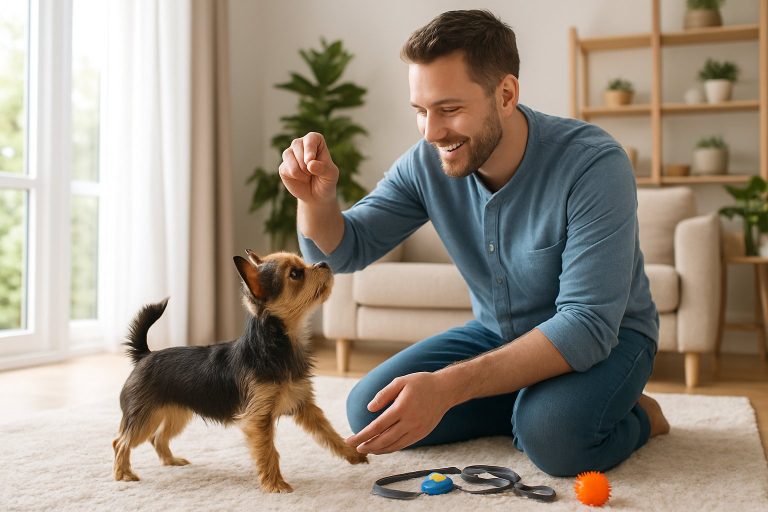Training your Chorkie can help you build a strong, positive relationship while making life at home easier for both of you. These energetic dogs may be small, but their playful personalities and smarts mean they need clear guidance right from the start.
Learning how to train your Chorkie the right way will set you up for a happy and well-behaved companion. This article shares five key tips to help you get started with your Chorkie’s training journey.
1. Start training early to build good habits from puppyhood
- Starting to train your Chorkie as soon as you bring them home is important. Puppies are ready to learn right away, and you can take advantage of their curiosity to teach positive behaviors.
- Early training helps your Chorkie understand what you expect from them. This is because puppies form habits quickly, and it’s easier to prevent bad behaviors than to fix them later.
- The best time to begin basic training is during the first few months of their life. You can start with simple routines, like potty training, which sets the stage for all future learning. A consistent training schedule helps your puppy know when to eat, play, and go outside.
- Short, frequent lessons work best for young Chorkies. Sessions between 5 and 10 minutes keep their attention and make learning fun. Building training into your daily routine keeps your puppy engaged and helps them grow into a well-behaved dog.
- Starting early also helps your Chorkie get used to new experiences, which makes them less fearful and easier to manage as they get older.
2. Use positive reinforcement like treats and praise consistently
- Chorkies respond best to positive reinforcement methods. This means you should reward your dog with treats, praise, or playtime whenever they do something right. Rewards make it more likely your Chorkie will repeat good behaviors.
- It is important to reward your dog immediately after the right behavior. This helps your Chorkie connect the action with the reward. Delayed rewards may confuse them.
- Consistency matters when training this breed. Give the same reward or praise each time your Chorkie follows a command. This builds a strong routine and makes training clear for your dog.
- Using positive reinforcement can also help strengthen the bond between you and your pet. Chorkies are eager to please, and regular praise keeps them motivated. For more details on positive reinforcement, you can read further about effective strategies and tips.
- Avoid scolding or negative feedback, as Chorkies may become fearful or stubborn. Stick to treats, praise, or short, happy play sessions to encourage learning. Regular, gentle rewards create a positive environment for your Chorkie to learn and grow.

3. Avoid shouting or punishing your Chorkie during training
- Chorkies are smart but sensitive. If you yell at or punish your dog for mistakes, it can cause fear and stress. This will make training harder and can break the trust between you and your pet.
- Instead of using harsh methods, focus on positive reinforcement. Give treats, praise, or petting when your Chorkie does the right thing. Positive feedback helps your dog learn faster and enjoy training.
- When accidents or mistakes happen, stay calm. Direct your Chorkie to the right behavior and reward them when they follow your cues. Dogs respond best to patience and kind, clear guidance.
- Using punishment or force can lead to anxiety and even make your Chorkie shut down during sessions. Experts agree that training built on trust and encouragement leads to better long-term results.
4. Focus on short, frequent training sessions to maintain attention
- Chorkies have a limited attention span, which makes long training sessions less effective. Keeping your sessions brief helps your dog stay interested and prevents boredom. Aim for several short training blocks, lasting just 3 to 4 minutes each.
- Daily repetition works better than long, tiring exercises. Spreading out sessions throughout the day lets your Chorkie practice skills while staying alert and engaged. This method can lead to faster progress and better retention of commands.
- Make training fun and rewarding to increase your Chorkie’s motivation. Use positive reinforcement, such as treats or praise, to mark every good choice. Fun activities and games, like scent work or simple agility, can add variety and keep sessions engaging and productive.
- Avoid distractions during training to help your Chorkie focus. A quiet space lets you build a strong foundation before moving to more challenging environments. Using short, focused sessions is one of the best ways to hold your dog’s attention and improve results.
5. Socialize your Chorkie with people and other pets regularly
- Early and regular socialization is important for your Chorkie. Expose your dog to different people, environments, and other animals to help prevent fear and anxiety in new situations.
- Take your Chorkie on walks in your neighborhood and let them safely meet calm dogs and friendly people. Puppy classes or playdates can also help your dog practice good social skills.
- Socialization helps Chorkies grow into confident and well-behaved pets. Dogs that are socialized from a young age are less likely to show aggression or nervous behaviors around strangers or in new places.
- Try to introduce new experiences in a gentle and positive way. If your Chorkie stays calm, reward them with treats and praise. These positive associations make it easier for your dog to feel comfortable each time.
- Consistency is important. Make socialization part of your Chorkie’s routine so they stay used to meeting new friends and exploring new environments.
6. Teach essential commands: sit, come, stay, and leave it
Start by teaching your Chorkie basic commands. These include sit, come, stay, and leave it. These commands help keep your dog safe and make daily life easier. Use short training sessions with plenty of treats and praise. Chorkies are smart but have short attention spans, so practice for a few minutes at a time.
7. Monitor body language to adjust training methods effectively
Watching your Chorkie’s body language is an important part of training. Your dog gives many small signals to show how they are feeling during a session. Clear signs can include wagging their tail, relaxing their ears, or making eye contact. If you notice your Chorkie looking away, tucking their tail, or yawning, they may be stressed or confused. Adjust your approach by slowing down or offering praise to create a more comfortable environment.
8. Avoid patting on the top of the head; use gentle petting instead
Chorkies, like many small dogs, can feel nervous if you pat them on the top of the head. This area is sensitive, and reaching over a dog’s head can feel threatening or uncomfortable to them. Most dogs, including Chorkies, prefer gentle petting under the chin, on the chest, or along their back. These spots are less intimidating and often feel safer for your dog.

9. Manage unnecessary barking with redirection and calm reassurance
Chorkies often bark to get attention, warn about strangers, or express excitement. Excessive barking, though, can become a problem. The first step is to notice when and why your Chorkie barks. If your Chorkie barks at noises or people outside, try gently redirecting their focus with a simple command such as “sit” or “look at me.” Give a treat or praise when they stop barking. This helps teach your dog what behavior you want instead.
10. Use crate training to aid housetraining and provide a safe space
Crate training is a practical tool when working with Chorkies. It helps you set clear boundaries and speeds up housetraining. A crate gives your dog a predictable place to rest and learn. Most dogs, including Chorkies, prefer having a small, cozy area they can call their own. The crate becomes a safe zone for your pet to relax and feel secure.


